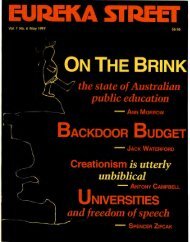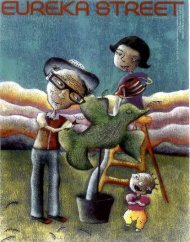15 July 2011 Volume: 21 Issue: 13 North Korea's ... - Eureka Street
15 July 2011 Volume: 21 Issue: 13 North Korea's ... - Eureka Street
15 July 2011 Volume: 21 Issue: 13 North Korea's ... - Eureka Street
Create successful ePaper yourself
Turn your PDF publications into a flip-book with our unique Google optimized e-Paper software.
<strong>Volume</strong> <strong>21</strong> <strong>Issue</strong>: <strong>13</strong><strong>15</strong> <strong>July</strong> <strong>2011</strong>Regional issues beyond the mad hatter’s tea partyPOLITICSRachel Baxendale‘Hasn’t the country had its fair share, and destroyed the country, and given us a desperadoin a big hat in the process?’This was Don Watson’s characteristically provocative opening to an interview with JudithBrett, author of the most recent Quarterly Essay, Fair Share: Country and City in Australia, at theWheeler Centre in Melbourne.Notwithstanding the current high profile of rural independents Bob Katter, Tony Windsorand Rob Oakeshott, and the prominence of issues such as the NBN rollout, live cattle exports,and the fate of the Murray-Darling Basin, flippancy and apathy are frequent features of anydebate where Australia’s pronounced country/city divide comes to the fore.When Q&A‘s largest-ever studio audience filled the Albury Entertainment Centre in May,Liberal senator Eric Abetz’s concerns about leftist bias received almost as much press publicityas the event itself.In contrast with the studio audience, the TV audience for the Albury Q&A was down on theweekly average, and the Twitter stream filled with disparagement from bored Fitzroy andSurry Hills pundits switching off their TVs.Metropolitan columnists from Catherine Deveny to Miranda Devine regularly fill columninches by hating on the bucolically backward.On the other hand, agrarian socialist rants from the likes of Katter don’t help thestereotyping, and it’s easy to paint the book burners at last year’s Murray-Darling Basinprotests as no more than ignorant, self-interested environmental vandals.Enter Brett with Fair Share, and finally there’s a voice in the debate that resists resorting tothe crude dichotomies and sweeping condescension that so often dominate perceptions onboth sides, and conveys the importance of Australians in the cities taking an interest in the fateof the country.30 per cent of the Australian population, 70 per cent of the Indigenous population, largenumbers of the nation’s long-term unemployed and increasing numbers of recenthumanitarian refugees call rural areas home. An interest in rural Australia’s future is thereforeimperative for anyone interested in the future of the nation as a whole.Some aspects of rural life at present are dire: 2010 Rural Woman of the Year and AlburyQ&A panellist, Alana Johnson, went as far as to term the state of rural health a ‘human rightsissue’.©<strong>2011</strong> <strong>Eureka</strong><strong>Street</strong>.com.au 43
















